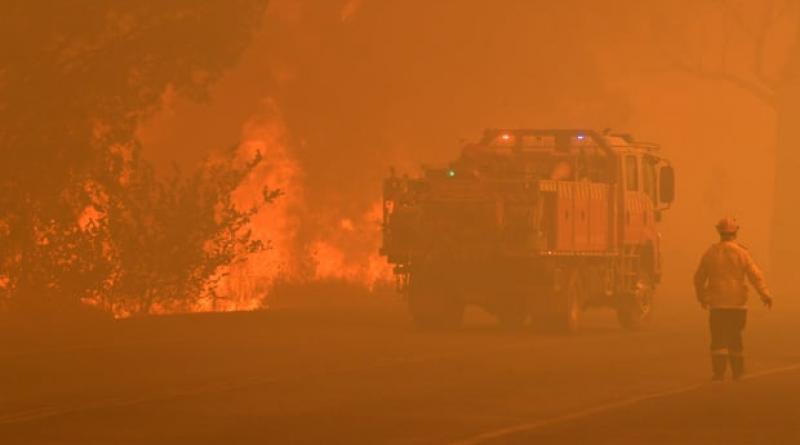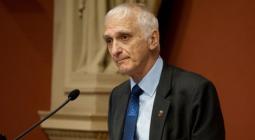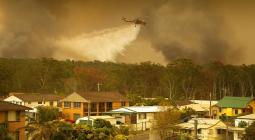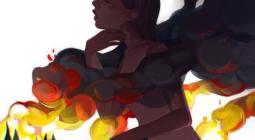Australia fires and weather: blazes out of control as heatwave expected to peak on New Year's Eve

Bureau of Meteorology issues wind warnings amid bushfires as temperatures expected to reach 44C north-west of Sydney next week
New South Wales firefighters are gearing up for hotter, drier and windier conditions next week, after a Christmas reprieve.
Meanwhile the Labor leader, Anthony Albanese, has repeated his calls for the federal government to compensate the thousands of volunteer firefighters who have been battling the fires for months, after a Coalition minister questioned the sustainability of the volunteer model.
On Saturday morning there were more than 70 fires burning across the state, with eight out of control and about 23 being controlled, as the unprecedented bushfire crisis continued.
Saturday began with no fires above advice level after more than 1,500 firefighters in the field took advantage of milder conditions over the Christmas week to strengthen containment lines and prepare for a forthcoming heatwave and high fire danger.
However, on Saturday afternoon the Currowan fire on the south coast was upgraded to a watch and act, with a significant increase of fire activity to the west of Nelligen.
The Green Wattle Creek fire in the southern highlands is also among those still out of control, according to the NSW Rural Fire Service (RFS), but the Gospers Mountain “megafire” and the nearby Grose Valley fire, to the north-west and west of Sydney, are listed as being controlled.
At least three fires remain burning in South Australia at advice level, including two on Kangaroo Island, at Bunbury, and at Cudlee Creek where there have been flare-ups in recent days.
In Western Australia, a watch and act warning remained in place for a fire in Gnowangerup, which started in the Stirling Range national park.
In Victoria, residents in parts of the East Gippsland region were urged to evacuate on Saturday afternoon ahead of a bushfire that threatened to hit Goongerah and nearby Martins Creek within the next 48 hours.
The CFA has declared a district fire ban for the Mallee fire for Sunday, and for the entire state on Monday.
The Blue Mountains city council mayor, Mark Greenhill, said this year’s extended bushfire season meant locals were living with immense stress.
The area continues to be affected by the Ruined Castle and Grose Valley fires, which spread from the Gospers Mountain mega-blaze to the north.
The Green Wattle Creek fire to the south may also pose a threat in the future, Greenhill said, adding the community was “far from out of the woods”.
“For the whole community this is a very stressful, long endurance episode for them; it just goes on and on,” he said on Friday.
The NSW emergency services minister, David Elliott, meanwhile, has gone on a family holiday overseas but says he will continue to receive twice-daily RFS updates.
“If the bushfire situation should demand it, I will return home without hesitation,” Elliott said.
The prime minister, Scott Morrison, faced widespread criticism after going on a family holiday to Hawaii in the midst of the bushfire crisis without publicly announcing it, and with his office reportedly telling journalists he was not in Hawaii.
Morrison returned early last week, apologising for going away. He continued to face criticism for his government’s failure to develop a credible climate change policy.
He was also earlier criticised for saying volunteer firefighters “want to be there”, when asked by Guardian Australia if they should be compensated.
On Tuesday, Morrison announced government employees would all receive standardised paid leave if they were volunteer firefighters but the opposition leader said it did not go far enough.
On Saturday, Albanese said it been more than a month since he wrote to Morrison about doing more to address the fires.
“No firefighter should have to choose between continuing to serve their community with courage and distinction and being able to provide the essentials of life,” he said.
Albanese said there was precedent for providing financial relief to volunteer firefighters and noted a government minister had now questioned the sustainability of relying on volunteers.
The veterans’ affairs minister, Darren Chester, told the ABC on Friday there had to be a conversation about compensation.
“Can it be sustainable in the longer term when it’s actually required under these changed climatic conditions, to be out there in the field for days, weeks and months?” Chester said. “That’s a long time away from your family.”
At least nine people, including two firefighters, have been killed in fires this season – eight of them in NSW.
Almost 1,000 homes are estimated to have been destroyed in the NSW bushfire crisis, according to the most recent impact assessment from the RFS, published on Christmas Eve.
Another 68 facilities and 2,048 “outbuildings” were also confirmed destroyed.
More than 7,800 homes have been saved by firefighters.
Canberra has added the Wingecarribee local government area, which covers NSW’s southern highlands, to the areas eligible for Australian government disaster recovery payments of $1,000 per adult and $400 per child, as well as recovery allowances for people who lost income because of the fires.
Grants of up to $10,000 are also being made available to people who have had their uninsured homes damaged or destroyed by the recent South Australian bushfires, and who need to replace or repair their homes or replace essential household items.
Bush Fire Fact - Don't give fire a chance
Total fire bans were in place for the southern ranges, southern slopes and Monaro alpine areas in NSW, and the ACT, where hot and windy conditions were bringing elevated fire danger.
The RFS urged people to prepare their homes, including raking leaves, moving firewood stocks away from the house, and patching up gaps in tiles and other places where embers could catch.
The Bureau of Meteorology issued a strong wind warning for the Macquarie coast, Hunter coast, Sydney coast, Illawarra coast, Batemans coast and Eden coast on Saturday, and the Macquarie coast, Hunter coast and Sydney coast on Sunday.
Temperatures were forecast to be above or well above average across the state for the rest of the year.
“A near-stationary high pressure system over the Tasman Sea extends a ridge towards the northern New South Wales coast, while a trough of low pressure extends across south-western parts of the state,” the bureau said on Saturday.
“This pattern will allow increasingly hot air to be drawn down from central Australia during the next few days, with heatwave conditions returning in many areas.”
Saturday was expected to see highs of around 29C in Sydney but nearing 40 in the western and north-western suburbs. High 30s to low 40s were predicted for multiple regions of NSW, with the coolest temperatures in the northern rivers region where most places would hover around the high 20s.
Temperatures will peak on New Year’s Eve, with 44C in Richmond, 35C in Sydney and 33C in Wollongong before a possible late storm.
In South Australia, Adelaide was in the grips of its second heatwave in as many weeks with forecasters tipping more to come this summer.
After four days with temperatures above 40C last week, the city was expected to have the second of four similar days on Saturday.
Police have charged a 71-year-old man for allegedly lighting a fire without a permit north-west of Moruya on the NSW south coast, causing a 40-hectare bushfire in the Wandera state forest, and charged another man for allegedly lighting two bushfires near Cessnock in the Hunter.
Australia bushfires factcheck: are this year's fires unprecedented?
The monster': a short history of Australia's biggest forest fire






